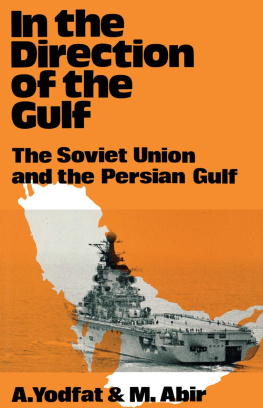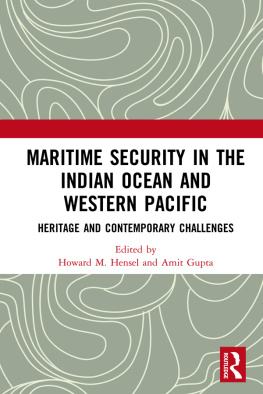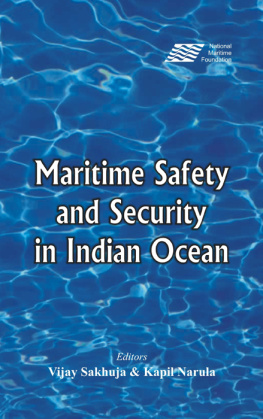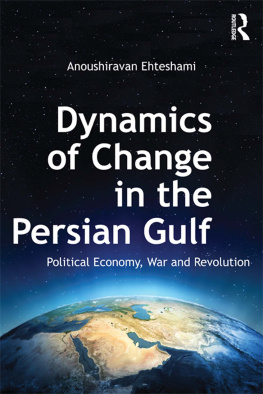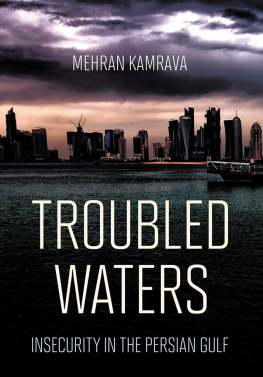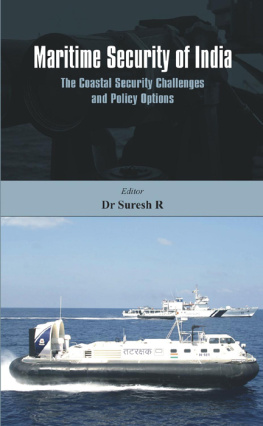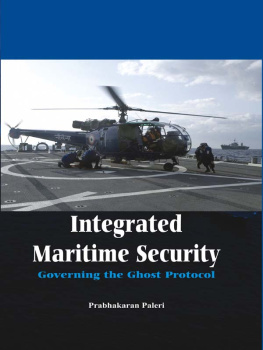Security and Territoriality in the Persian Gulf
Security and Territoriality in the Persian Gulf
A Maritime Political Geography
Pirouz Mojtahed-Zadeh
First Published in 1999
by Curzon Press
1999 Pirouz Mojtahed-Zadeh
Reprinted 2003 by RoutledgeCurzon
11 New Fetter Lane
London EC4P 4EE
Transferred to Digital Printing 2003
RoutledgeCurzon is an imprint of the Taylor & Francis Group
All rights reserved. No part of this book may be reprinted or reproduced or utilised in any form or by any electronic, mechanical, or other means, now known or hereafter invented, including photocopying and recording, or in any information storage or retrieval system, without permission in writing from the publishers.
British Library Cataloguing in Publication Data
A catalogue record of this book is available from the British Library
Library of Congress Cataloguing in Publication Data
A catalogue record for this book has been requested
ISBN 0700710981
There are many areas of border dispute in the region of the Persian Gulf as potentially explosive as that of the Kuwait crisis of 199091.
Ten years have gone by since the ceasefire put an end to the IranIraq war and the two countries have not been able to settle their border differences; Iraq has only grudgingly suspended claims of sovereignty over Kuwait in spite of the bitter lesson the country was taught in January 1991; whereas Saudi Arabias claims to the islands of Qaruh and Umm al-Maradim, currently controlled by Kuwait, have been kept at a low profile, they are not to be taken lightly.
Though Bahrain and Qatar have agreed to refer their disputes over the issue of the Hawar archipelago, the shoals of Dibal and Jaradah, and the related seabed, to the International Court of Justice, an adjudication not satisfactory to both parties could renew serious conflict. Saudi Arabia, on the other hand, has proved that it is prepared eventually to allow the force of arms to be the judge of its territorial differences with Qatar.
Saudi Arabias broad-based and rather inconclusive border arrangement of 1974 with Abu Dhabi concerning Al-Liwa and Khor al-Udayd, which also embraces border differences with Qatar, is too vague and too unreliable to support the idea that territorial and border disputes between Saudi Arabia and the United Arab Emirates have been resolved in full.
The United Arab Emirates has revived claims to the islands of Greater Tunb, Lesser Tunb and Abu Musa and entered into open dispute with Iran on the issue of sovereignty over these islands. The Sultanate of Oman has, in the course of little more than 15 years, delimited her boundaries with Iran, the United Arab Emirates, Saudi Arabia and the Yemen. Nevertheless, Oman has territorial differences with the United Arab Emirates over areas in the Diba region.
None of the territorial and border disputes in the Persian Gulf region is a new phenomenon. These disputes have existed for decades without seriously threatening peace and security in the region.
The changing world order, which manifested itself most tangibly in 1991 with the demise of the Soviet Union and the success of the unprecedented military operation of the US-led coalition in the Gulf, introduced a new dimension to territorial and border disputes in a new era of security uncertainties in that region. The highlighted vulnerabilities of these changed circumstances in the Gulf region necessitate a more thorough study of the areas of territorial and boundary differences in that region.
Yet, as territorial and boundary disputes in the inland areas of the Persian Gulf have been studied quite extensively in many works of scholarly standing, attempts are made in this book to restrict the study of territoriality and boundary differences to the maritime areas only. In this context, there are two major areas of difference which need to be studied in more detail. These are IranUAE differences on the ownership of three islands and the QatarBahrain differences on a number of islands and shoals. On the other hand, since arguments of ownership of any geographical space rely heavily on historical foundations of territoriality in that geographical space, prominence has been given throughout this book to the history of the emergence of the states involved in the territorial disputes under study as well as dealing with the historical background to all these disputed geographical localities.
In this book, attempts will be made first to introduce the background to the historical and geographical settings in the Persian Gulf, and to the instances of settled continental shelf boundaries in the region ().
These four sections are designed to represent the story of successes and failures of the treatment of security matters pertaining to territorial and boundary affairs in the maritime areas of the Persian Gulf only. This in turn, I hope, will present an example of the study of the impact of territoriality on global-wide maritime security.
Pirouz Mojtahed-Zadeh
London
This work was partly prepared in 1986 in the form of a research project. Early versions have appeared in various publications both in English and Persian. It was completed in its present form in June 1994 and was amended in July 1998.
Late Professor Jean Gottmann, an internationally respected political geographer of our time, under whom I studied at Oxford in the late 1970s, was very generous in advising me on a number of concepts discussed in this work in its early stages. I owe him an immense debt of gratitude.
Dr Najib Naeimi, Qatars Minister of Justice, and Mr Karim Al-Shakar, former Ambassador of the State of Bahrain in London, were very kind in reading parts of the early versions of this book without making any suggestion. Nevertheless, I owe them both much gratitude.
Former Iranian Minister of Foreign Affairs, Mr Amir Khosro Afshar, who was personally involved in the development of some stages of the affairs related to Irans former claim to Bahrain and their withdrawal, and to Irans seizure of the islands of Tunbs and Abu Musa in the early 1970s, was very kind in providing me with his personal knowledge of these developments. I am most grateful to him for his generosity.
Dr Parviz Mina, formerly in charge of the National Iranian Oil Companys international relations, who negotiated and signed many of Irans continental shelf boundary agreements in the Persian Gulf in late 1960s and early 1970s, has been generous in sharing with me his personal notes and memoirs of these agreements. I owe him much gratitude. My sincere thanks are also due to Mr Heshmat Mina for his constant encouragement of my academic work and for facilitating my interview with his brother Dr Parviz Mina.
I am most grateful to Mr Abbas Maleki, former Deputy Minister of Foreign Affairs of the Islamic Republic of Iran for Research and Education for assisting me in studying Iranian Foreign Ministry documents. Similarly, Mr Haj-Husseini, former director of the Institute of Political and International Studies (IPIS) of the Ministry of Foreign Affairs, Mr Kavousi, head of the document centre of the IPIS, and Mr Abdollahi, head of the document centre and exhibition of the Foreign Ministry were most helpful in making it possible for me to see the documents of Iranian Foreign Ministry on the special permission of former minister of foreign affairs, Dr Ali-Akbar Velayati.
Mr Shams and his colleagues at the National Document Organisation of Iran and Mr Kalateh and his colleagues at the document centre of the Contemporary Historical Studies Centre generously assisted me in sifting through the documents of their establishments. My sincere thanks are due to them.


